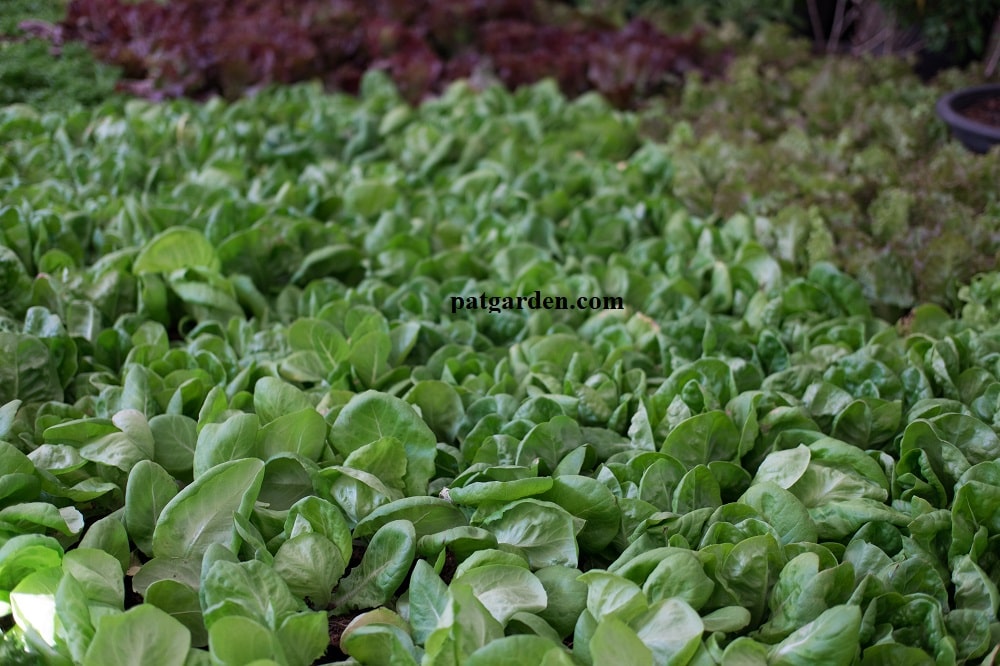Lettuce comes in different varieties. Some varieties usually thrive in summer and others in winter. You need to select your lettuce variety based on the current weather before thinking about planting.
So, will lettuce grow in winter? Yes. But this can only happen if you give your crops some protection during this cold weather. Cold temperatures can easily damage these winter salad leaves.
The good news is that planting lettuce in winter should be done in a cold frame, greenhouse, and hoop house. These structures create an ideal environment for lettuce to thrive.
Lettuce comes in different colors such as light green, dark green, deep purple, red, and even molted colors. These other colors will create a welcoming sight for your winter garden.
Some of the popular lettuce varieties to grow in winter are romaines, butterheads, oakleaf lettuce, bibbs, icebergs, and leaf lettuce.
We recommend doing a tiny bit of research and pick a variety that does best in your area. Those gardeners living in Virginia can choose any of the above arrays.
It is also advisable to note that lettuce harvesting depends on the variety. Some varieties take longer to harvest than others. It would be best if you exercised patience before putting the green salad in your bowl.

Is Lettuce a Winter Crop?
Growing lettuce in your garden is not only meant for warmer summer months but also colder winter months. The culture will ensure you get a steady supply of tasty leaves of a winter salad.
So, is lettuce a winter crop? Not really. But there are plenty of hardy lettuce varieties that can survive both in winter and summer conditions. Besides that, there is no specific season to plant, grow, and harvest lettuce.
The option to consider is lamb’s lettuce since it can tolerate cold weather and low light levels. This lettuce variety experiences quick germination and harvesting can be done within six to eight weeks.
But if you own a greenhouse or a hoop house, then you are on the safe side. These structures will protect your lettuce crops from frost and snow. The chances of getting better yields are relatively high.
The most exciting thing is that caring for lettuce plants in winter is quite simple and easy. You only need to create a conducive environment in a hoop house or greenhouse to enjoy the taste of these leafy plants.
However, you need to pay a lot of attention since any snow leak in the lettuce beds will cause damage. Take the time to seal every possible hole on top of your greenhouse or hoop house.
Will Frost Kill Lettuce?
Crop protection is something many gardeners tend to take seriously regardless of the season. It is one of the reasons behind the gradual growth in greenhouse farming across the country.
So, will frost kill lettuce? Not really. Lettuce is hardy crops, and they usually thrive in cold weather. However, lettuce can tolerate light frost of about 20 to 30 degrees.
One of the most exciting things about growing lettuce in winter is that the frost usually sweetens the leaf flavors. But it is advisable to protect the newly planted lettuce seedlings from the late spring or early fall frost.
Covering the lettuce seedlings with a frost blanket or transplanting them in a greenhouse is a better option. The idea will enable the newly planted crops to grow faster since cold weather slows the growth rate.
The good news is that all types of lettuce can withstand brief frost and freezing weather. However, prolonged exposure to frost will damage the outer lettuce leaves. All lettuce varieties grow in the USDA hardiness zone of about 2 to 11.
Does Lettuce Need Full Sun?
Lettuce is among the most adorable leafy green vegetables. Every family with a backyard garden will do everything to plant and grow vegetables.
So, does lettuce need full sun? Not really. Lettuce is a crop that can tolerate some shade. But research shows that the plant grows faster when exposed to full sun.
However, lettuce crops to full sun in the afternoon will cause dehydration and even deny the leaves the opportunity of being sweet.
We recommend irrigating the plants to prevent wilting from taking place. The hot sun causes the evaporation of water from the soil and leaves.
In Conclusion
Lettuce is an exciting crop to consider growing in your backyard garden. It is resistant to cold winter and warm summer months. But you are expected to pay a lot of attention since lettuce is so delicate.
Meanwhile, you can still plant and grow lettuce in winter. It is advisable to transplant the lettuce seedlings to either greenhouse or hoop house to prevent massive frost damage.
